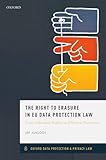The right to erasure in EU data protection law : from individual rights to effective protection / Jef Ausloos.
Series: Oxford data protection and privacy law: Publisher: Oxford : Oxford University Press, 2020Description: xxv, 529 pages.Content type: text Media type: unmediated Carrier type: volumeISBN: 9780198847977.Other title: Right to erasure in European Union data protection law.Subject(s): European Parliament. General Data Protection Regulation| Item type | Current library | Class number | Status | Date due | Barcode | |
|---|---|---|---|---|---|---|
| Book | House of Lords Library - Palace Dewey | 343.99904 AUS (Browse shelf(Opens below)) | Available | 021080 |
Browsing House of Lords Library - Palace shelves, Shelving location: Dewey Close shelf browser (Hides shelf browser)

|

|

|

|

|

|

|
||
| 343.999 MED Media law and policy in the internet age / | 343.999 REE Internet law : | 343.999 RES The responsibilities of online service providers / | 343.99904 AUS The right to erasure in EU data protection law : from individual rights to effective protection / | 343.99904 REE Making laws for cyberspace / | 343.999041 COM Computer law : | 343.999041 LLO Cyber law in the United Kingdom / |
"This book critically investigates the role of data subject rights in countering information and power asymmetries online. It aims at dissecting 'data subject empowerment' in the information society through the lens of the right to erasure ("right to be forgotten") in Article 17 of the General Data Protection Regulation (GDPR). In doing so, it provides an extensive analysis of the interaction between the GDPR and the fundamental right to data protection in Art.8 of the Charter of Fundamental Rights of the EU (Charter), how data subject rights affect fair balancing of fundamental rights, and what the practical challenges are to effective data subject rights. The book starts with exploring the data-driven asymmetries that characterise individuals' relationship with tech giants. These commercial entities increasingly anticipate and govern how people interact with each other and the world around them, affecting core values such as individual autonomy, dignity and freedom. The book explores how data protection law, and data subject rights in particular, enable resisting, breaking down or at the very least critically engaging with these asymmetric relationships. It concludes that despite substantial legal and practical hurdles, the GDPR's right to erasure does play a meaningful role in furthering the fundamental right to data protection (Art. 8 Charter) in the face of power asymmetries online."-- Provided by publisher.
